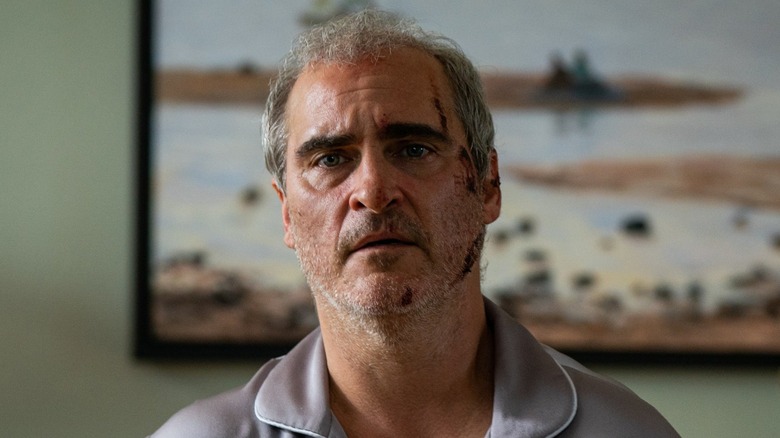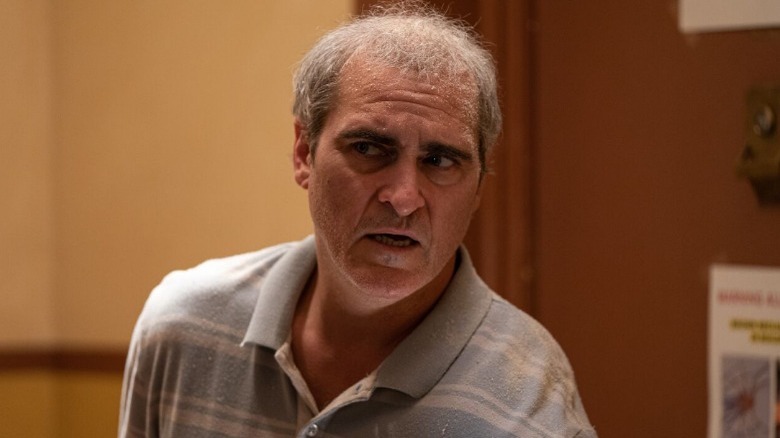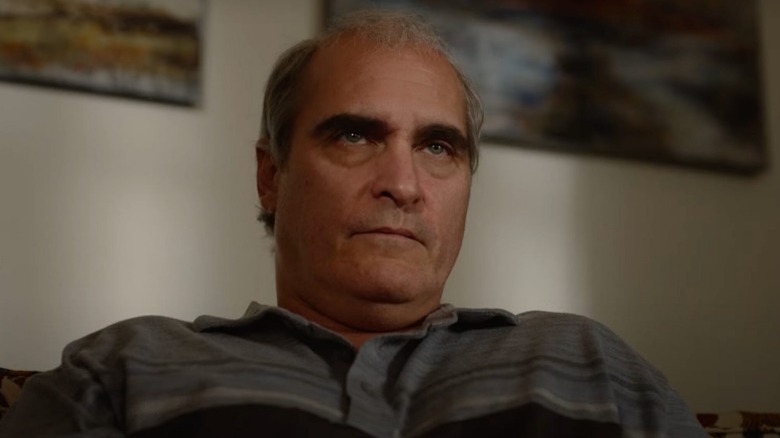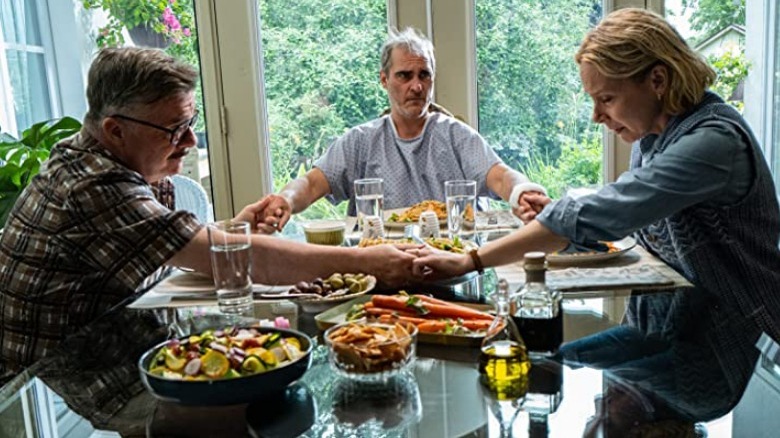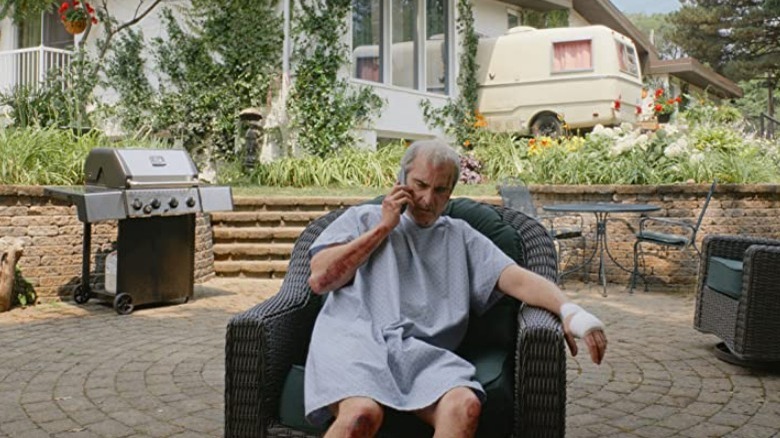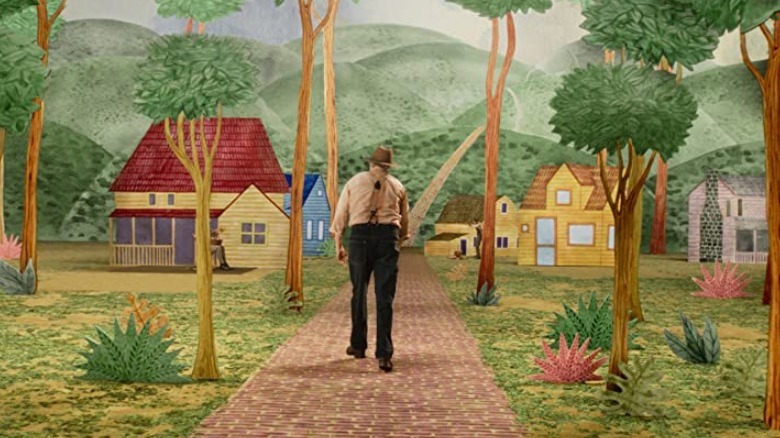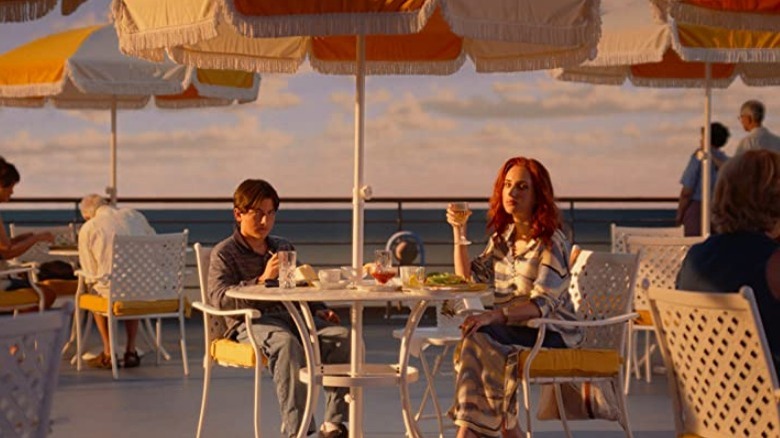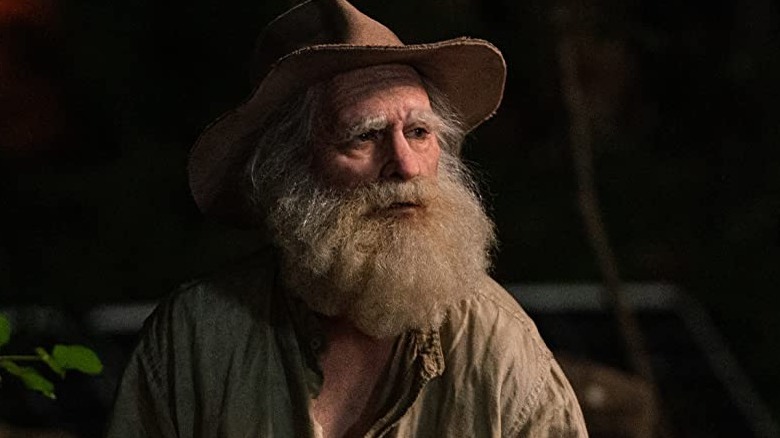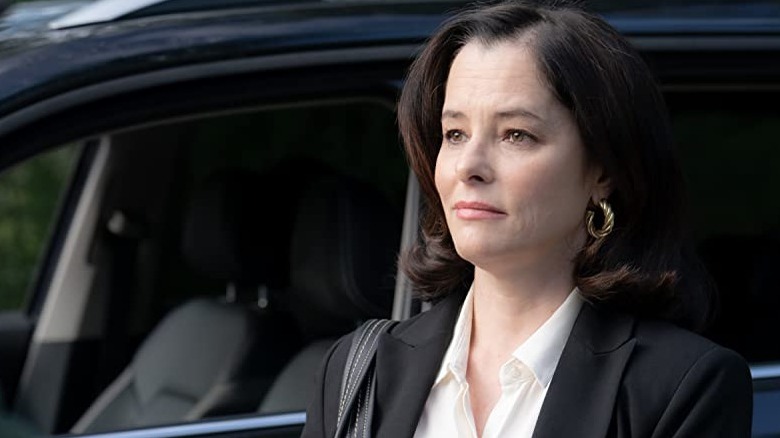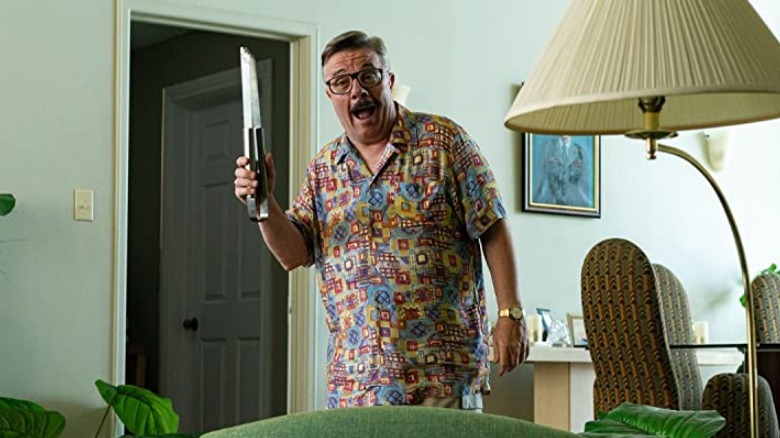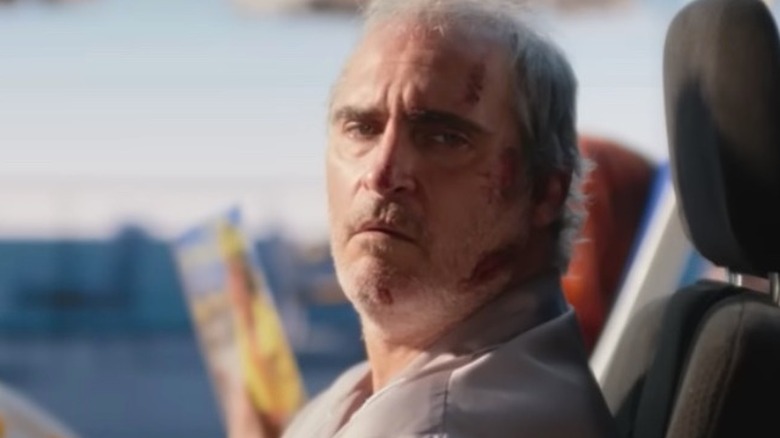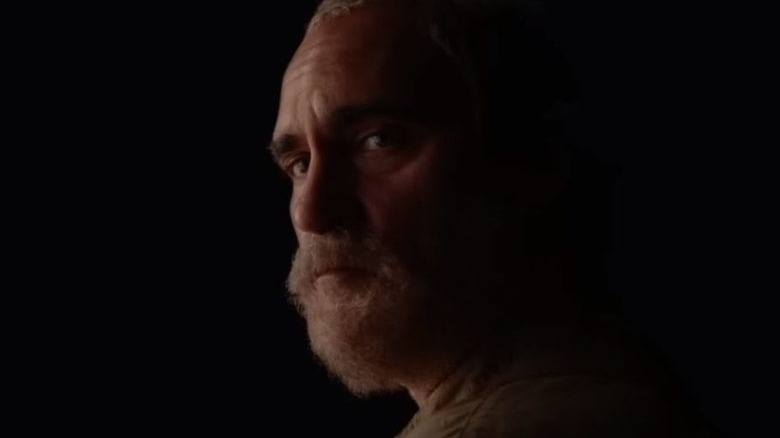The Ending Of Beau Is Afraid Explained
Much like Ari Aster's 2018 debut film "Hereditary," the movie "Beau is Afraid" deals with family trauma passed down from parents to their children. In this case, however, the trauma takes a much weirder form.
The movie's plot starts out simple enough: an anxiety-stricken Beau (Joaquin Phoenix) must travel to attend the funeral of his mother (Patti LuPone). However, the film quickly goes off the deep end. Some fans may leave the theater wondering what the heck happened. Why does Beau keep having a recurring dream about his mother giving him a bath? How does Beau suddenly end up with three children? And what's up with the disturbing monster in the attic?
One cannot hope to explain every single surreal moment in the movie — nor should someone, since the movie is not necessarily meant to make total sense. Below, however, is an attempt to shed some light on the underlying themes behind the story and what the bonkers ending of "Beau is Afraid" could possibly mean.
How much of the movie is real?
With all the surreal things that happen in "Beau is Afraid," it's easy to go down a rabbit hole of wondering what's real and what isn't. For instance, do a bunch of strangers actually raid Beau's apartment? Is it a metaphor for how he feels powerless about his life? Or is it just a trippy fever dream?
If you get too hung up on the details, you'll just end up with a headache. The best way to appreciate the movie is to just experience it without worrying too much about which parts are real. As far as Beau is concerned, everything in the movie happens for real. And Beau's perspective is the only one that matters, because the movie is supposed to immerse the viewer completely in Beau's mind. The movie is intended to express what it's like to live with constant anxiety — and many critics have praised the film for accurately capturing that overwhelming feeling.
Director Ari Aster told The Daily Beast, "[Beau's world] is meant to be a clown mirror of the real world that is awful in all the same ways that our world is awful, but the dial is turned up." Beau lives in constant fear that the worst is going to happen. So, in Beau's world, the worst actually does happen — every time, without fail. Of course it's not an accurate representation of reality, but it's something more profound: A glimpse into the headspace of somebody with overwhelming anxiety and serious mommy issues.
What is Beau's biggest fear?
As one would expect in a movie titled "Beau is Afraid," the titular character has countless fears, ranging from irrational phobias — like his concern about swallowing mouthwash — to legitimate reasons to be terrified; after all, who wouldn't be freaked out by a brown recluse spider loose in their apartment? But one fear looms larger than all of them: What Beau fears most is disappointing his mother, Mona Wasserman.
Although she doesn't appear in-person until the ending, Mona casts a shadow over the entire film. Her supposed death is what kicks the story in motion, and as Beau journeys to attend her funeral, he is constantly worrying about what his mother would want him to do. Later, Beau discovers that Mona isn't dead; instead, she faked her death to see how her son would react. Mona is convinced that Beau didn't try hard enough to reach the funeral, which only confirms her belief that Beau never loved her.
Mona tries to control every aspect of Beau's life, even his thoughts. When Beau tries to tell her that he already suspected she wasn't dead, Mona cuts him off, saying, "I saw what you knew and didn't know." The implication is that she knows his mind better than he does, and that Beau would be insolent to even suggest otherwise. At the end of the movie, Mona lists everything she feels Beau has done wrong with his life (even though none of these were Beau's fault). This, of course, is Beau's worst fear come true.
What is the significance of the statuette?
Viewers will notice that Beau never seems to go anywhere without the white ceramic statuette of a mother holding a child, purchased from a man selling figurines in the street near the beginning of the movie.
For Beau, this figurine becomes almost like a security blanket. He keeps it tucked in his pocket for most of his journey, and he can be seen clutching it while he's in the bathtub. Even when he is stark naked and running for his life, Beau still clings to the statuette, because he believes it is the one thing he cannot live without. The symbolism is obvious: It is actually his mother that he cannot live without. The figurine is a constant reminder of Mona's suffocating influence.
Thankfully, Beau's tight grip on the statuette loosens over time. When Beau gives the statue as a gift to Penelope (Hayley Squires), this shows that he is starting to heal. Beau has just begun to realize that maybe he can live a happy life even without his mom's looming presence. Naturally, Mona (who can somehow see everything Beau does) won't let Beau forget this. By giving the figurine to a complete stranger instead of to his mother, argues Mona, Beau has betrayed her.
Amusingly enough, the movie reveals that Beau's statuette is identical to a larger statue outside Mona's house. But why a random salesman in the street would have a model of this statue is anyone's guess.
Why do Roger and Grace idolize their dead son?
Roger (Nathan Lane) and Grace (Amy Ryan) take Beau under their wing after they accidentally hit him with their car. Although they have an empty bedroom, they make their daughter Toni (Kylie Rogers) share her room with Beau, because the empty bedroom once belonged to their son Nathan before he died in combat. Roger and Grace worship Nathan. They would rather ask Toni to sleep on the couch than disturb their shrine to Nathan. They even have a jigsaw puzzle with their son's face on it.
The whole situation is absurd, but there's a grain of truth to it. Although Roger and Grace's reactions are exaggerated, they still reflect the way that some people prioritize honoring the dead over taking care of the living. Of course you should pay your respects to a deceased loved one, but it becomes questionable if you are so deep in mourning that you neglect your loved ones who are still alive.
This plot thread mirrors Beau's relationship with his mother. Beau mourns the loss of his mother as much as any person would, but Dr. Cohen (Richard Kind) tries to make Beau feel guilty about not caring enough about his dead mother. Cohen accuses Beau of delaying the funeral and disregarding his mother's final wishes — no matter that Beau would've gladly come to the funeral if he hadn't been recovering from an accident. This is yet another way that Beau is emotionally manipulated by those around him.
Why does Beau blame himself for everything?
The theme of guilt hangs over the entire movie. Right from the beginning, Beau's therapist (Stephen McKinley Anderson) asks him if he feels any guilt; he automatically takes Beau's silence as a "yes."
Time and time again, Beau blames himself for things that are not his fault or beyond his control. He feels guilty because he has delayed the funeral, and because Toni's parents love him more than they love her own daughter. During the play, he is imprisoned for a crime he didn't commit, and he briefly wonders if it actually was his fault. Even the note that Grace leaves for him ("Stop incriminating yourself") ironically carries an accusatory tone.
Naturally, Beau has been conditioned to think this way by his mother. In Beau's recurring nightmare (which Mona later tells Beau is actually a memory), viewers see that Mona responds to her son's questions about his father by asking, "Are you trying to hurt me?" If this is any indicator of Beau's childhood, then his mother was constantly accusing him of hurting her. Beau must have been blamed so many times as a child that he internalized it, and now he blames himself for everything, without even needing to be told by anyone.
Does Beau actually have three sons?
As Beau watches a play unfold onstage, he imagines himself as the star of the play. Through the play, Beau envisions a fairy-tale version of his life, the kind of life he wishes he had. Stage-Beau builds his own home, falls in love, and has three children. Even though Stage-Beau's life is challenging (he spends years separated from his family), it is still more fulfilling than Beau's real life. At least Stage-Beau has a life filled with purpose.
At the end of the play, Stage-Beau is reunited with his children; at this moment Beau realizes that his fantasy can never become reality. Whenever one of Beau's sons asks him what happened to their mother, Beau cannot answer. He knows it's impossible for him to ever start a family, thanks to a genetic condition that, according to Mona, will kill him instantly if he has sex. (This may not necessarily be true, as viewers later learn.) For Beau, this is a cruel reminder that even in his imagination, happiness will forever be out of reach.
If viewers choose to believe that Beau's "genetic condition" doesn't exist, the play demonstrates that Beau has missed the opportunity to live a fulfilling life because he is living in constant fear of what might happen if he falls in love. Or, if viewers believe that Mona was right and Beau is indeed cursed, then this moment proves that Beau never had a chance; he was always doomed to live a lonely life.
What is the meaning of Beau's recurring nightmare?
At the beginning of "Beau if Afraid," Beau tries to tell his therapist about a recurring dream. It is clearly something he wants to get off his chest, but his therapist merely chides him for getting off-topic.
Later in the movie, viewers get to see Beau's dream, or more like a nightmare, which contains two versions of Beau. One is Beau as a young boy (James Cvetkovski), refusing to get in the bath until his mother tells him what happened to his father. Another Beau is behind the camera, already waiting in the bathtub and watching silently. The boy seen onscreen is a stronger, more rebellious Beau. He knows what he wants (to know the truth about his father) and is not afraid to stand up to his mother. Just like the Beau from the play, he is a version of Beau that could have been.
Meanwhile, the Beau behind the camera is helpless and submissive. He doesn't speak, merely watches. When his mother orders him to return to the bath, he obeys. This is the same Beau seen throughout the movie, one who Mona claims is "born without the mechanism to choose."
When Mona banishes the other Beau to the attic, this symbolizes her crushing Beau's spirit. She is stomping out Beau's spark of independence and locking that side of his personality away, so that Beau will remain completely dependent on her. Judging by the movie's conclusion, Mona has probably succeeded.
What really happened to Beau's father?
It's hard to tell what exactly happened to Beau's father, because the movie offers three conflicting explanations. At first, Mona tells Beau that his father died the instant Beau was conceived, because his father had the same genetic condition that Beau does. Later in the film, a man (Julian Richings) approaches Beau after the play and says, "Your father is alive. I knew him after I worked for your Mom." This leaves Beau reeling, because it means that his mother has been lying. Beau even begins to wonder if this man is actually his father, since the man says, "I'm so happy to see you" as though it's a much-anticipated reunion. Strangest of all is what Beau discovers in the attic from his nightmare. Up there, Beau finds a giant penis with a face, which Mona tells him is his real father. "You see now why I lied?" she cries.
For good reason, viewers will be thoroughly confused. Presumably the giant penis must be real, since Mona admits she lied to hide this horrifying truth. Still, that doesn't quite add up, since if Beau's "genetic condition" was made-up, then why did his mother forbid him to fall in love?
Some viewers have suggested that Beau's father is portrayed as a penis because his identity is irrelevant; he just impregnated Mona and walked out of her life. Others have argued that the penis actually represents Beau's sexuality, which he has locked away, just like his alternate self was locked away.
What happens after Beau loses his virginity?
Beau's fear of his "genetic condition" comes to a figurative and literal climax after he reconnects with his childhood crush Elaine (Parker Posey) and gets into bed with her. As he gets passionate with Elaine, Beau expects to die just like his father did.
To his utter surprise, Beau survives. He discovers that having sex is actually not so scary after all, and that maybe his mom was wrong. This moment embodies a larger epiphany for Beau, as he discovers what it's like to make decisions for himself, free from his mother's influence. It's exhilarating — but alas, it's too good to last. When it's all over, Beau is perfectly fine, but Elaine has died instead, seemingly from the same condition that killed Beau's father. For Beau, this is a fate worse than death, because it means he must live with the knowledge that he will never truly find love.
It's ambiguous whether this is a natural consequence of Beau having sex, or if Beau's fear of disobeying his mother is simply distorting his perception of reality. Most likely, Beau's encounter was harmless, but Beau's mother has scarred him so deeply that he believes something horrible will happen if he disobeys her. It doesn't matter whether or not it's really possible for Beau to kill Elaine just by sleeping with her. Beau fears it might be true, so naturally that makes it true for him.
Was everyone working for Mona all along?
Watching "Beau if Afraid," audiences may be reminded of "The Truman Show." Both movies ultimately reveal that the protagonist's loved ones are all involved in a conspiracy, and it turns out that a parental figure with godlike abilities is the one pulling all the strings. In "The Truman Show" it's Christof (Ed Harris), in "Beau" it is Mona.
At the end of "Beau is Afraid," Mona reveals that Beau's therapist worked for her all along, secretly recording all his therapy sessions with Beau. In retrospect, that explains why the therapist was so preoccupied with telling Beau that it was okay to say that he wished his mother was dead. He wasn't trying to help Beau process his emotions; he was trying to trick him into saying "disloyal" things about his mother.
Were Grace and Roger in on it, too? After all, the couple has surveillance cameras constantly pointed at Beau, and Roger's excuse for why he can't drive Beau to his mother's house seems awfully convenient. Of course, since Grace is the one who tells Beau where to find the camera footage, it's possible she could've gotten cold feet.
The biggest question mark is Elaine. On one hand, Elaine mentions that she worked for Mona up until Mona died (though maybe she just meant a normal job). Yet, Mona denies that Elaine ever worked for her. It's unclear if Elaine's sudden death was all part of Mona's plan or something Mona simply capitalized on after it happened.
Was everything just a test?
After Beau discovers that Grace and Roger were spying on him, Toni tells him, "You failed your stupid test!" Toni never elaborates on this, but it's possible she means that Mona's funeral was a test of Beau's dedication to his mother, and Beau "failed" because he didn't beg hard enough for Toni's parents to take him. In fact, everything that happens in the film, from the funeral invitation to the temptation of sleeping with Elaine, could be seen as a test of Beau's loyalty. Apparently Mona has been watching Beau the whole time, waiting for him to screw up.
If it is a test, then Beau was set up to fail. His mother expects the impossible of him. Nowhere is this more apparent than when Dr. Cohen and Mona humiliate Beau in a dramatic trial that is clearly stacked against him.
All this points to the possible theory that Beau's entire universe was created by Mona to test her son. After all, Mona Wasserman's hometown of Wasserton is clearly named after her, which suggests that the entire world revolves around her. As well, the photos on Mona's walls, which show Beau posing in advertisements for his mother's business, hint at the possibility that Beau's memories of his childhood could be no more real than these advertisements. Of course, maybe Mona cannot actually manipulate reality — maybe it just feels that way to Beau, since his mother is so controlling. So, perhaps Beau's world is a metaphor for his mother's suffocating presence.
What does the ending note mean?
Beau's trial ends when his boat explodes, presumably killing him. Although Beau's death seems random and pointless, there might actually be method to this madness.
One possible interpretation is that the boat, just like everything else in the trial, is rigged against him. Maybe the boat was designed to explode by the end of the trial, as Beau's punishment. The explosion demonstrates Mona's total control over Beau's life. She brought him into this world, and she can take him right back out. So she does exactly that, though she seems to immediately regret it, because the viewer can hear her distant sobbing.
Or maybe Beau did successfully kill his mother, and the trial exists only in his head, as a manifestation of his guilt. Perhaps the "explosion" is Beau punishing himself for Mona's murder (that is, he kills himself).
Alternatively, there's another way to read the ending of "Beau is Afraid." Perhaps Beau allows himself to die because he knows it's the only way he can break free of his mother's control. While Mona clearly enjoys tormenting Beau, she doesn't seem to want him dead, as suggested by her crying in the end. Once again, viewers may be reminded of a scene from "The Truman Show," where Truman ties himself to a boat in the middle of a storm and then dares Christof to kill him. Although Beau's life is in his mother's hands, perhaps he will get the final laugh, because now he has figured out exactly how to hurt her.
